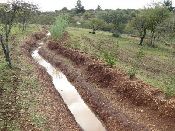|
The area and people
The majority of farmers are small farmers, but farmers are increasingly also involved in off-farm activities.
Added value of DESIRE for stakeholders
Stakeholders think that the DESIRE approach is effective in identifying the causes and effects of land degradation, and can help to make a reasonable strategy of sustainable land management. The evaluation of measures of local and external stakeholders gives a clear understanding of importance and benefit of different technologies.
Study site stakeholder workshops
Land users and government officials.
Limitations of spontaneous implementation of soil and water conservation practices
Since the 1950s, soil and water conservation has been carried out in this region and some progress has been made. The vegetation cover increased and many silt-collection dams have been built. Yet this achievement can not cover the fact that soil erosion is still very serious and land degradation is still a big problem in this region. The main reason for this is that many constraining factors for soil and water conservation still exist. These factors include lack of financial and technical support, and insufficient involvement of local land users in the decision-making process and the low economic return of soil and water conservation practices.
Stakeholder groups
Government/project staff
- The Office for Soil and Water Conservation in the Yanhe River Basin, and its branches in Ansai and Baota County
- Environment Monitoring Center for Soil and Water Conservation of Yellow River Basin
- Institute of Sand-Control of Shaanxi
Public administration
- agriculture
- forestry
- land
- water
- livestock
- environment
Research Centres and Universities
- Institute of soil and water conservation, CAS
- Northwest A&F University
Schools
- Some primary and middle school for environment protection education
Land users
Sustainability goals
Soil erosion and water shortage are the main limiting factors on the Loess Plateau even after long time of implementation of integrated measures. The sustainable development of agriculture systems and the rural economy without more ecological cost in the Loess Plateau is the main objective of research and projects including of DESIRE.
| Goal 1 |
Reduction of soil erosion and runoff losses; |
| Goal 2 |
Improvement of the water use efficiency of precipitation; |
| Goal 3 |
Maintenance of function and production of soil and vegetation; |
| Goal 4 |
Conservation of bio-diversity; |
| Goal 5 |
Maintenance of the loess landscape; |
| Goal 6 |
Improvement of local socio-economic condition; |
| Goal 7 |
Reduction of sediment load of the Yellow River; |
| Goal 8 |
Mitigation of flood risk of the lower reaches of the Yellow River and Its branches. |
Source: expert estimate by study site coordinator
|



